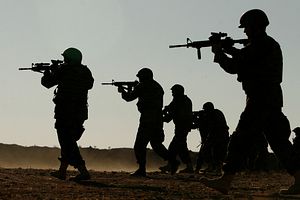Contrary to expert expectations and the predictions of many analysts, the death of the Taliban’s leader brought about almost no struggle for succession in the group. Haibatullah Akhundzada, a savvy religious scholar, was selected on May 25 by the leadership council to replace the cunning Akhtar Mohammand Mansour. A potentially unifying leader, Akhundzada possesses no skill and experience in either leading an insurgency or managing diplomatic relations.
With the Taliban’s struggle to fill the vacuum left behind by Mansour and the changing regional and domestic dynamics of conflict, the Afghan government—and its international allies—should fight if they want peace. Akhundzada, for all he lacks as the Taliban’s new leader, may still be able to unify the group anew.
Although there was no immediate struggle for the top spot, Mansour’s death nonetheless opened a leadership vacuum in the group, one that can hardly be filled by Akhundzada alone. Mansour was a meticulous war strategist, a charismatic and, at times, brutal leader, in addition to being a persuasive diplomat. Major attacks against the Afghan government, including the overrunning of Kunduz and two deadly bombings in Kabul, were proof of Mansour’s operational strategy, despite his initial struggle to consolidate power among the Taliban last summer.
Mansour’s successor, however, is neither a strategist nor a diplomat. Akhundzada is reportedly an austere religious leader who is known for his very strict adherence to Islamic law, as evidenced by his brutal verdicts as a Sharia judge. He is also reported to be a clean man, leading a very simple life like the Taliban’s one-eyed founder, Mullah Omar. Mansour, meanwhile, was involved in drug trafficking for personal gain and lived a lavish lifestyle.
Akhundzada–for the same reasons he is no Mansour–can still become a unifying figure. His leadership, as someone who hasn’t been a battlefield commander, provokes no outright jealousy. Instead, as a pious religious scholar, his personality demands respect and esteem from the group’s members. He is a Noorzai, a tribe that felt discriminated by the Taliban and tried to oppose Mansour’s leadership by swearing allegiance to Mullah Rasoul. Akhundzada’s leadership neutralizes that internal threat. Also, his deputies make up for what he lacks: one is a brutal war strategist—Serajuddin Haqqani—and the other an esteemed heir to the Taliban throne—Mullah Omar’s son, Yaqub. They can compensate for what Akhundzada lacks in strategic skill.
Now is the best time for the Afghan government to move decisively against the Taliban, making the most of a clear victory on the battlefield. Akhundzada’s passive yet rigid religious leadership will keep the Taliban together, but it does open the door for his deputies, mainly Haqqani, to become the de facto leaders of the insurgency. The Afghan army must move quickly to destabilize Taliban ranks before they manage to fill the vacuum of leadership left behind by Mansour’s death.
The strike that targeted Mansour showed that the United States is disappointed with Pakistan’s performance in the War on Terror. As an outgoing U.S. president, Barack Obama will likely act firmly in his final months to dismantle the Taliban. The strike has put Pakistan even closer to isolation thanks to Afghan President Ashraf Ghani’s active international engagement. Ghani should take advantage of the chance to put further pressure on the Pakistani military establishment to cut ties with the Taliban, and target their sanctuaries within its borders. Pakistan’s increasing isolation and mounting international pressure have upped the Taliban’s incentives to diversify their patrons and bases of operation out of Pakistan—as evidenced by Mansour’s trips to Iran. While killing one leader does not kill the insurgency, the ensuing power vacuum, the leadership transition, and the potential to provoke internal rivalry may weaken the Taliban significantly on the inside.
Another important factor that will help the Afghan government bring the Taliban to the negotiating table is the status of other insurgency networks. The Taliban’s new main rival, a franchise of the self-proclaimed Islamic State, is growing increasingly weaker under attacks from the Taliban, American drones, and the Afghan Army. On the other hand, Ghani has almost reached a deal with the stubborn insurgency leader, Gulbuddin Hekmatyar of Hezb-e-Islami. While the deal with Hekmatyar will bear little effect on the insurgency, it will show a functional peace process in which an insurgent leader gives up arms and joins the Afghan government in the presence of international troops and current Afghan constitution. A weak Islamic State affiliate and a neutralized Hezb-e-Islami allow the Afghan Army to concentrate on fighting the Taliban and also encourage the group to talk with Afghan government on more flexible terms.
As the Afghan Army enters its second year fighting without the direct support of international combat forces, its performance grows. News of army checkpoints being overrun or military units running out of munitions while fighting now rarely make the headlines. Enjoying air support and growing more accustomed to fighting on its own, Afghan security forces have a good chance to push the Taliban back hard enough for them to see no viable option except seriously returning to peace talks. It only requires the strategic vision and political will of the Afghan government to commit itself to fighting this long war, while also cultivating regional and international support for peace.
Moh. Sayed Madadi is an Afghan Fulbright Graduate Scholar at New York University and a former Hurford Fellow of the National Endowment for Democracy. He tweets @madadisaeid.

































